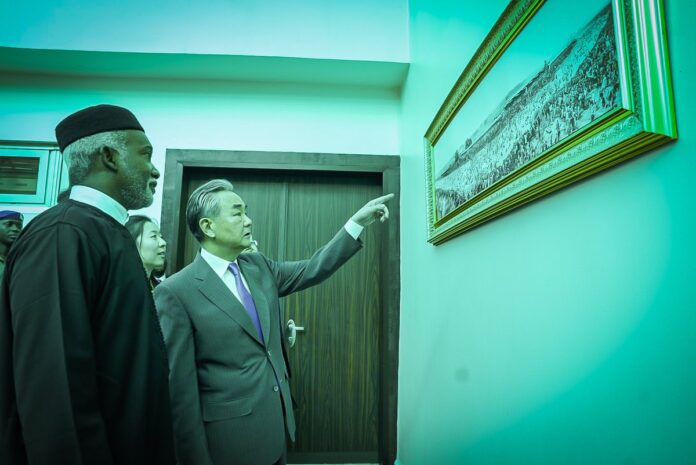In a bold move to strengthen national defense and sovereignty, Nigeria has announced a strategic partnership with China to domesticate the production of military equipment. This collaboration aims to circumvent the persistent delays and bureaucratic hurdles involved in relying on foreign suppliers for critical defense needs.
The announcement was made during a joint press briefing at the Presidential Villa, Abuja, where Nigeria’s Minister of Foreign Affairs, Ambassador Yusuf Tuggar, and his Chinese counterpart, Wang Yi, addressed the press. The meeting, which was part of Wang Yi’s official visit to Nigeria, underscored the growing ties between the two countries in defense, finance, and regional security.
“By working with China, we aim to ensure the local production of both kinetic and non-kinetic military equipment. This will eliminate the long waits and regulatory roadblocks that currently delay our procurement efforts from abroad,” said Ambassador Tuggar. He further emphasized the need for Africa to take charge of its own security challenges without undue reliance on foreign intervention.
A New Approach to Military Self-Reliance
The issue of foreign military involvement has been a point of contention in Africa. Tuggar highlighted the increasing concern over the growing influence of private military companies from outside the continent. “Private military companies, no matter where they are from, will not solve our security problems. Africa must take ownership of its own defense,” he remarked.
Nigeria’s leadership role in regional peacekeeping was also acknowledged during the briefing. Tuggar stressed that Nigeria has consistently led efforts in addressing security challenges not only in West Africa but across the continent. “We have shown leadership in peace and security, and we believe that partnering with countries like China will further strengthen our position,” he said.
By focusing on domestic production, Nigeria hopes to sidestep the delays caused by procurement processes, which are often exacerbated by cumbersome regulations and the geopolitical factors that influence international arms trade. The new plan, Tuggar explained, is not just a one-off initiative but part of a broader vision for Nigeria to develop its own military-industrial base.
Partnership with China: More Than Just Military Equipment
The Nigeria-China partnership goes beyond military concerns. Both governments are eager to build on a relationship that has evolved over decades. During his remarks, Minister Wang Yi highlighted the achievements of the bilateral cooperation, particularly the elevation of their relationship to a comprehensive strategic partnership.
“Over more than half a century of diplomatic ties, China and Nigeria have always respected each other’s sovereignty. Our partnership has led to practical cooperation in various fields, including trade, security, and infrastructure,” Wang said. He emphasized the importance of their collaboration in international forums, with both nations working together to advance the interests of the Global South.
Wang noted that China is particularly enthusiastic about Nigeria’s financial initiatives, including the issuance of panda bonds—bonds denominated in Chinese yuan. “We welcome Nigeria’s plan to issue panda bonds. This shows our deep confidence in Nigeria’s financial credibility,” Wang stated. The proposed currency swap and the issuance of panda bonds are part of a larger strategy to enhance financial cooperation between the two nations and provide Nigeria with the necessary resources for infrastructure development.
Security and Sovereignty: A Clear Message
The broader message of the press briefing was clear: Nigeria is committed to ensuring its sovereignty in both military and financial matters. Tuggar reiterated that Nigeria has never had expansionist ambitions and continues to work within the framework of its constitution. “Our responsibility to our people and to Africa is why other countries have so much confidence in Nigeria’s leadership,” he explained.
This collaboration with China, according to Tuggar, is a testament to the country’s commitment to taking charge of its own security and defense. He firmly stated that Nigeria would not entertain the idea of allowing external forces, whether private military companies or foreign powers, to solve its security problems.
In line with this stance, Nigeria is also strengthening its domestic military production capabilities. The government has outlined plans to establish local factories and production lines for both kinetic and non-kinetic military equipment. This move is expected to significantly reduce Nigeria’s dependency on external sources for arms and ammunition, fostering self-reliance in defense matters.
Regional Impact and Implications
The partnership with China is not just significant for Nigeria’s national defense but also has wider implications for the entire African continent. Nigeria’s position as a regional leader in peacekeeping and security makes its decisions on military matters highly influential.
“The idea of working with China in this capacity is not just about military equipment. It’s about strengthening Africa’s overall security infrastructure,” Tuggar said, stressing that the African Union (AU) and other regional bodies should support initiatives that promote self-sufficiency in defense.
The new strategic alignment between Nigeria and China may also prompt other African nations to reconsider their approach to defense procurement and foreign intervention. Many African countries have long faced challenges with foreign military influence, and Nigeria’s new direction could serve as a model for the continent.
China’s growing role in Africa, particularly in areas of infrastructure development and security cooperation, continues to expand. The partnership with Nigeria signals China’s intent to further consolidate its position in the region while providing Nigeria with the necessary tools to secure its borders and manage internal conflicts effectively.
Looking Ahead: A Stronger, Independent Nigeria
With a stronger focus on domestic military production and enhanced financial cooperation with China, Nigeria is positioning itself as a more self-reliant and influential player on the global stage. The strategic partnership with China, particularly in military matters, will undoubtedly have far-reaching consequences for both countries and the African continent at large.
As the world shifts toward a more multipolar order, Nigeria’s partnership with China represents a significant step toward a future where African nations take greater control of their security, economic, and political destinies. The next few years will likely see more African nations adopting similar models of cooperation, with Nigeria at the forefront of this transformative movement.

